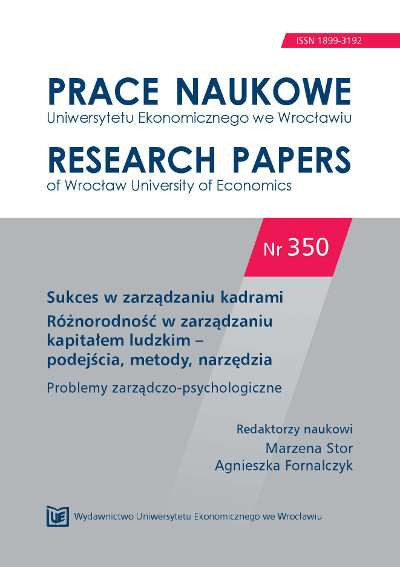Wyczerpanie emocjonalne i cynizm jako przykład problemów zawodowych osób zatrudnionych w elastycznych formach pracy
Emotional exhaustion and cynicism as an example of professional problems of employees working in flexible forms
Author(s): Magdalena Ślazyk-Sobol, Małgorzata DobrowolskaSubject(s): Economy
Published by: Wydawnictwo Uniwersytetu Ekonomicznego we Wrocławiu
Keywords: burnout; flexible forms of employment; cynicism; emotional exhaustion
Summary/Abstract: The article presents the results of research conducted on a sample of n = 2,118 employees working in nine flexible forms of employment: substitute employment, teleworking, temporary work, seasonal work, within the framework of civil law contracts, part-time work, fixed time job, in the social economy and self-employed. The problem of experiencing symptoms of the phenomenon of burnout − emotional exhaustion and cynicism was analyzed using the MBI-Maslach Burnout Inventory − General Survey. The license was bought for the study and authors obtained approval for using MBI method (Received from Mind Garden, Inc. on March 21, 2013). The questionnaire was translated and subjected to a preliminary validation by M. Ślazyk-Sobol. The aim of the presented study is to determine the level of burnout in groups of flexible workers and also to compare the level of burnout components taking into account the form of employment. The results present an alarming level of burnout in all flexible forms, beyond the sector of social economy and civil law contracts (these groups experience the average level of burnout). Emotional exhaustion at average and low level occurred among part-time workers, substitute employment and people employed in the social economy. The researched groups were characterized by high cynicism, however, an important difference appeared among teleworkers and social economy workers. The results of this component were significantly lower among these employees. Presented research was exploratory, but the results encourage to the implementation of preventive tools, including employee development programs − primarily training or coaching, which could support the competence of workers of flexible forms experiencing the phenomenon of burnout. Additionally, the prevention of burnout should also consist of changes in personnel policies, reflected in the creation of a given climate and culture, in which the main values are taking care of health, but also the fulfillment of professional staff.
Journal: Prace Naukowe Uniwersytetu Ekonomicznego we Wrocławiu
- Issue Year: 2014
- Issue No: 350
- Page Range: 371-382
- Page Count: 12

